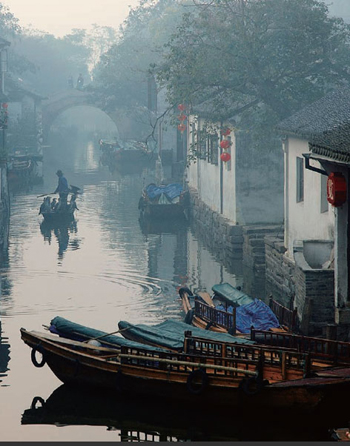The Kunshan Way
Chapter 1: China and the Kunshan Way
If you are interested in how China has risen so quickly, the Kunshan Way will show you part of the equation. But, to understand it, you will need to keep four things in mind: China operates on a different set of social and economic assumptions; China's government structure is a top-down hierarchy; the things you hear and read about China are often misleading; and the best way to understand China is to go to Kunshan. If you do, I can promise you it will be a pleasant and enlightening experience.
Different Assumptions
Put simply, it is about how the process is being driven. In the US, we believe that a prosperous and stable society can only be achieved through the "free market mechanism,"in China they believe that a "harmonious and sustainable society" can only be achieved through centrally orchestrated planning and implementation. The issue is not whether you agree or disagree, it is just that you understand that there is a different set of assumptions.
Top-down Hierarchy
While there are many different types of government structures in the West, few go as far as China in terms of a centrally planned and managed system. The system has two components—the Communist Party and the government—which often seem to be one in the same, but are functionally distinct. Both share a top-down structure where political policies and operational directives are made in Beijing and sent to the provinces and municipalities to be implemented.
Misconceptions
One of the other major barriers we face in trying to understand China is the popular misconceptions that dominate people's thinking and the media. The leading four are: the basic lack of knowledge about the country, its history, culture and structure of its government; the constant flow of "China business books" with their anecdotal tunnel vision focusing on how to make money in China; the never ending stream of articles, books and talking heads who see China's economic development as a "long-march" political strategy; and the unfortunate fact that the voices and experiences of those who have been shaping China's economic development, while vigorously debating and discussing the issues internally, have been largely silent when it comes to broadcasting their views to the rest of the world.
Ignorance
A few years ago, I was trying to set up a meeting between the governor of Wisconsin and Deng Pufang. I was talking to the person in charge of the International Department for the Wisconsin Department of Commerce. I kept emphasizing that in addition to being the chairman of the China Disabled Persons Federation, he was the son of Deng Xiaoping. After a number of exasperating minutes, she asked me, "Why do you keep mentioning this Deng Xiaoping person?" I asked her if she had heard of Mao Zedong. Answer: "Yes. Well Deng had a similar role after Mao." There was a bit of silence and then the conversation moved on. China was Wisconsin's fourth largest trading partner at the time.
Self-Interest: Cheap Labor and Globalization
Jack Perkowski was promoting his book Managing the Dragon to a club I am part of. He was what you would expect of an offensive lineman/investment bankerturned China business mogul. He gave a slightly varied version of the "white man's economic burden" where he generously took partial responsibility for bringing China into the global economy, as he was making a fortune. He was less responsive when I asked him, in essence, how the natives would fare in the future without their "great white chief." Let me be clear, he was an effective speaker and pleasant enough person, but the focus of his book, like so many others like it, reduced China to an economic cog in some global dash for cash. This type of self-righteous economic colonialism may be in vogue, but it is a flawed rationalization which has led to more tears than gold.
 0
0 








Go to Forum >>0 Comments